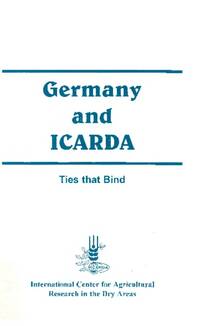Ties that Bind: Germany and ICARDA

Authors:
Germany possesses one of the world’s leading industrialized economies and has for many years been actively funding overseas development projects through the annual allocation of many millions of Deutschmarks.
Like all partnerships, there have been mutual benefits drawn from the relationship which have enriched the understanding of both parties but above all the relationship has resulted in a worthwhile and lasting contribution to the alleviation of poverty in the world’s extensive dry areas.
The impact of the scientific work, funded by Germany, at ICARDA and collaborating institutions has been considerable since the 1970s and will continue for many years to come as new crop varieties or technologies flowing from this support are adopted by resource-poor farmers. In addition, the young scientists and technicians, who have benefited in training and in experience from the collaboration, will continue the fight against poverty thanks to the initial impetus their work received from Germany and ICARDA.
To judge just how important Germany is to the transfer of scientific understanding that eventually benefits the rural poor, it is necessary only to look at the example of the biotechnology research supported by Germany at ICARDA. It is anticipated that biotechnology will make an immense contribution to the alleviation of poverty. With the financial support of Germany, and with access to the cutting edge expertise of its biotechnology scientists, the dry area countries are not to be excluded from this particular revolution in plant science.
